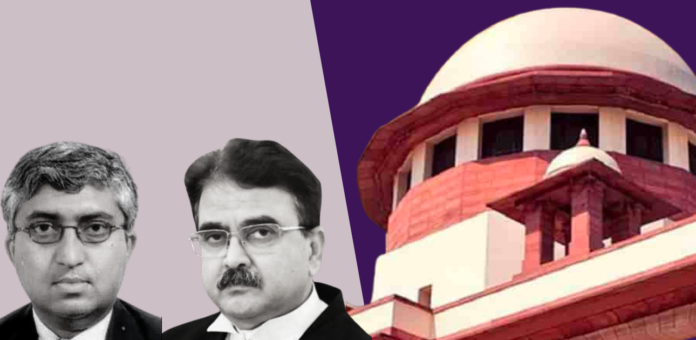All legal procedures pertaining to the caste certificate scam were shifted from the High Court to the Supreme Court on Monday, following a breach between two sitting judges of the Calcutta High Court. The ruling was made in a suo motu case by a bench that included Chief Justice of India DY Chandrachud, Justices Sanjiv Khanna, BR Gavai, Surya Kant, and Aniruddha Bose. The suo motu case was started when the Calcutta High Court’s Justice Abhijit Gangopadhyay issued an odd directive to “ignore” a stay order issued by a division bench led by Justice Soumen Sen.
The Supreme Court held off on commenting today regarding the alleged altercation between Justices Gangopadhyay and Sen, citing concerns that doing so would compromise the decorum of the High Court’s proceedings. It would not be appropriate to heap criticism on a single judge or division bench. Anything we say will have the effect of undermining the high court’s dignity. We’ll deal with it somehow, Chief Justice Chandrachud declared. Nonetheless, the highest court announced that the Supreme Court will now handle the matter that started the contentious proceedings in the High Court.
“We will send the writ petition and letters of patent appeal proceedings to the Supreme Court. After some time, we will list it and take care of it. This court will hear the appeal under Article 226 and the letters patent. Let the pleadings conclude in the interim,” the Supreme Court declared. A number of prominent solicitors brought up incidental issues in front of the Supreme Court bench today.
“Justice Gangopadhyay is still handling cases of this nature. On behalf of the State of West Bengal, Senior Advocate Kapil Sibal submitted, saying, “He will keep doing the same thing.” Tushar Mehta, the solicitor general, made a suggestion that there were some “shocking facts” involved. For kids who are members of Scheduled Tribes and Scheduled Castes, Senior Advocate KTS Tulsi made an appearance. But today, the Supreme Court limited the hearing to just transferring the High Court proceedings to itself, declining to comment on the rivalry among the High Court judges.
“A High Court Chief Justice is in charge of assigning cases.Let us not usurp his authority,” the CJI continued. The case began with a petition that was brought before the High Court, in which it was claimed that West Bengal had been issuing forged caste certificates. It was initially brought before Justice Abhijit Gangopadhyay, who, despite the fact that the petition had no such prayer, ordered a CBI investigation. The same day, a division bench consisting of Justices Soumen Sen and Uday Kumar halted the single-judge’s judgement. Nevertheless, Justice Gangopadhyay allowed the case files to be turned over to the CBI that same day, noting that the state attorney had not been informed of the division bench’s stay decision.
Moreover, Justice Gangopadhyay issued another order on January 25, the very following day, stating that the division bench ruling should be disregarded. A number of insults were directed at Justice Sen in the aforementioned order, alleging that he was an “interested party.” In the order, he claimed that Justice Sen had recently summoned Justice Amrita Sinha, a different judge from the Calcutta High Court, to his chambers and informed her that Trinamool Congress leader Abhishek Banerjee’s political destiny should not be interfered with by judicial rulings. On January 25, Justice Sen issued a second decision that criticised the ruling made by Justice Gangopadhyay and mandated that the CBI return the case files to the state.
On Saturday, January 27, the Supreme Court took notice of the disagreement and halted the High Court’s single-judge and division bench procedures. Additionally, the court suspended Justice Abhijit Gangopadhyay’s, a single judge’s, decision for the CBI investigation. In connection with this, Justice Gangopadhyay has experienced controversy before.
In April of last year, the Supreme Court strongly objected to him speaking to a TV channel about Banerjee while the bench was hearing a case involving the politician. Shortly afterward, during an extraordinary late-night session, the highest court was forced to set aside a directive issued by Justice Gangopadhyay, which required its Secretary-General to submit the report pertaining to the aforementioned interview.






